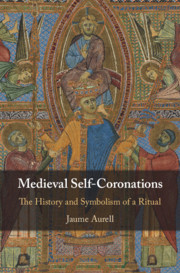Book contents
- Medieval Self-Coronations
- Medieval Self-Coronations
- Copyright page
- Contents
- Figures
- Acknowledgements
- Introduction
- 1 Self-Coronation As Ritual
- Part I Heritage
- 2 Consecration without Mediation in Antiquity
- 3 The Hand of God
- 4 Symbolic Self-Coronations in Byzantium
- 5 The Sacralisation of Carolingian Accessions
- 6 Anglo-Saxon and Ottonian Christocentrism
- Part II Infamy
- Part III Convention
- Index
4 - Symbolic Self-Coronations in Byzantium
from Part I - Heritage
Published online by Cambridge University Press: 20 May 2020
- Medieval Self-Coronations
- Medieval Self-Coronations
- Copyright page
- Contents
- Figures
- Acknowledgements
- Introduction
- 1 Self-Coronation As Ritual
- Part I Heritage
- 2 Consecration without Mediation in Antiquity
- 3 The Hand of God
- 4 Symbolic Self-Coronations in Byzantium
- 5 The Sacralisation of Carolingian Accessions
- 6 Anglo-Saxon and Ottonian Christocentrism
- Part II Infamy
- Part III Convention
- Index
Summary
The fourth chapter analyses what scholars have called ‘symbolic’ or ‘heavenly’ coronations in Byzantium. With the expansion of Christianity throughout the Mediterranean, self-coronation and the mediation of priests became a point of divergence. Emperors in Christian Byzantium are to be crowned by the patriarchs in ritual practice, but they are frequently crowned by the iconographic representation of the ‘hand of God’. This chapter engages in a comparative analysis of the reality of church intervention in the real performative ceremony of the imperial coronation and the imaginative fiction of the crowning of the emperor directly by Christ and his angels and saints, as established in some iconographic representations. In Byzantium, imperial art was given the task of translating into a visual and symbolic – but not necessarily referential – language the values and ideology that prevailed in each dynasty concerning the source of its power.
Keywords
- Type
- Chapter
- Information
- Medieval Self-CoronationsThe History and Symbolism of a Ritual, pp. 96 - 126Publisher: Cambridge University PressPrint publication year: 2020

